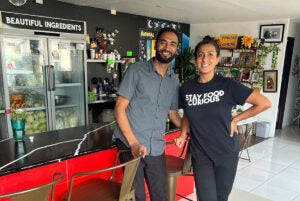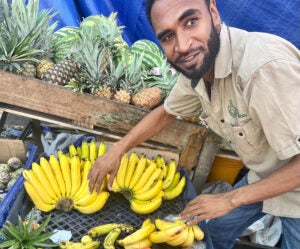“Not enough people appreciate what they’re biting into when they eat a tomato,” said Varun Baker, CEO of Farm Credibly, an ag finance company based in Kingston, Jamaica. He is hoping to show consumers what they’re missing out on by putting heirloom tomatoes in farmers hands and on people’s plates.
Baker has plans to showcase heirloom varieties of tomatoes, melons, peppers, and other crops to customers in a collaboration with two new partners: Marianna’s Kitchen and Baker Creek Seeds.
Marianna’s Kitchen, founded by Marianna Farag, is a vegan restaurant in Kingston that serves a rotating menu six days a week. Farag initially connected with Richard Ramsay from Baker Creek Seeds, the largest North American heirloom seed company, which is experimenting with growing different varieties in Jamaica to see what thrives there.
When Farag was shopping for ingredients, she noticed a package of mixed hot peppers that she had never seen before.
“I had never seen this diversity before … so I asked the owner of the supermarket who was supplying him with these gorgeous peppers,” said Farag.
Farag featured these and other heirloom crops on her menu. When Baker heard of this, he decided to expand Ramsay’s efforts to promote growing heirloom varieties among more farmers, on the many different soils and farming styles practiced in Jamaica.
This three-way collaboration brings seeds, food, and finance all together into a fresh, farm-to-table project that aims to promote more awareness about crop diversity, nutrition, and sustainable farming.

Baker’s interest in agriculture began initially with food itself while he lived in Italy and noticed that there was a culture of appreciation to ingredients and food there. He gained an appreciation for savoring good food and was impressed by what a well supported agricultural sector looked like in Italy and how it was the foundation for the entire food chain.
Understanding that this was not the case in his home country of Jamaica, and wanting to address the many challenges that prevented it from being so, Baker is on a mission to fill these gaps. When he entered a hack-a-thon competition in 2018 hosted by a telecommunications company, he began to think about farming from a financial perspective.
“It’s hard for creditors to assess the risk profile of a farmer — and this results in less funding for the agricultural sector,” said Baker.
Despite the many opportunities for agriculture in Jamaica, from ample farmland to proximity to key export markets, financial investment is a huge barrier for many farmers and growers, as less than 2 percent of Jamaica’s lending portfolio is allocated to agricultural ventures.
Baker’s company, Farm Credibly, aims to change this by providing farmers with resources to better access credit and other financial literacy techniques. The primary focus so far is to “digitize” farmers’ businesses by getting them to accept digital payments. Baker noted that over 86 percent of Jamaicans are underbanked, meaning they do not use their account to its full advantage, and about 17 percent of Jamaicans do not even have a bank account.
By accepting digital payments, Baker wants to show farmers that they can use their digital bank account as more than just a place to store money, but also as a means to grow their business. One immediate benefit of using their bank account this way is to demonstrate creditworthiness to a financial institution, which can significantly boost the odds of securing a loan.
“These payments help show their creditworthiness, because the more they show what they’re earning and selling [to a lender], they’re better able to demonstrate that they can repay a loan for example,” Baker said.
Many farmers in Jamaica currently operate as subsistence farmers, and transitioning to a business model requires access to more financial funds than many have on hand. By boosting the financial literacy of farmers, they can be better positioned to decide whether they want to pursue farming as a profession.
Baker also wants farmers to be able to grow diverse, nutritional foods. With a decreasing number of smaller farming operations, he said the total biodiversity in crops grown worldwide has decreased by about 75 percent, and this loss is reverberating in many ways.
One consequence of this is the fact that a less diverse diet can lead to undernourishment from lack of adequate nutrients. Heirloom varieties are one way that consumers can diversify their diet, helping to circumvent this problem.
However, heirloom varieties can be tricky to grow and difficult to source. That’s why for World Food Day this year, Baker joined hands with Ramsay from Baker Creek Seeds to establish a pipeline for farmers to get their hands on heirloom seeds to grow and sell.
As a large seed supplier, Baker Creek Seeds can provide a reliable source of seeds for farmers to begin experimenting with how heirloom varieties will perform in their fields before selling them in their markets for a higher price that heirloom varieties typically command over conventionally grown varieties.
So far, over a dozen farmers have reached out to request heirloom seeds from Baker, and he anticipates that this number will double or triple in the coming months. With a network of over 150 farmers, he hopes to distribute the seeds to as many farmers as possible.

When asked if farmers are hesitant to try out these new heirloom varieties, Baker says that the biggest concern is that they might not sell.
“Farmers get it — it’s not a big effort to convince them to grow something different or see the value in heirlooms,” Baker said. “Farming is a scientific process, built on trial and error, and [we want] to try these on a small scale before scaling up.”
Baker hopes to see as many heirloom seeds in farmers hands as much as possible, so that farmers can grow a diverse array of crops that are nutritious and healthy, regardless of whether they are grown for themselves or for profit in a market.
“I want to encourage seed sharing, and seed saving programs,” Baker said. “I hope that heirlooms can contribute to the food supply [here].”
By collaborating with Marianna’s Kitchen and Baker Creek Seeds, Farm Credibly is hoping to establish a multi-pronged approach to show farmers and growers that they can grow nutritious, diverse crops that can become delicious, healthy meals while building up their business model.
“Everyone recognizes the challenge [of farming] … and we can do a better job if we are open to more diversity,” Baker said.
Liza Thuy Nguyen serves as the 2023 American Farmland Trust Agriculture Communications Intern at AGDAILY, with a focus on helping to amplify diversity and minority voices in agriculture. Liza is originally from Anaheim, California, and attended the University of California, Davis, as a first-generation college student. She received a bachelor’s degree in genetics and genomics and went on to earn a master’s in horticulture from Penn State.





